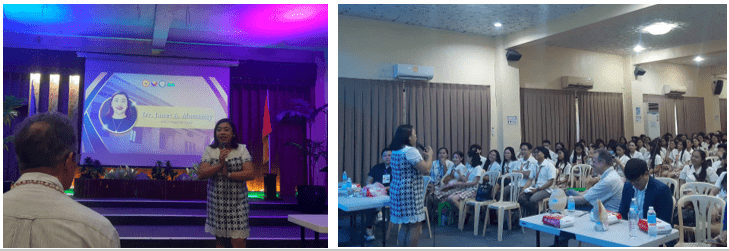CNU English Language Majors gathered on October 26, 2023 at the Tandang Sora Hall to listen and learn from an informative lecture series organized by Dr. Janet Mananay and the English Fellows Organization about the realities and complexities of the English language in globalization. The lecture started with a thought provoking question by Dr. Reynaldo Inocian in his Welcome Remarks which said, “Who owns the English language?” This question is a great way to open the talk as it unlocked the curiosity of the audience. Dr. Inocian concluded his message explaining that no one owns the English language exclusively because of the different varieties of English. Following the Welcome Remarks is the Inspirational Message from CTE Dean, Dr. Amelia Bonotan who emphasized how the Internet revolutionized our lives by creating a global society with a dynamic language. She said that in this era, we have to embrace the effects of globalization and part of it is to be open to the changes of language. 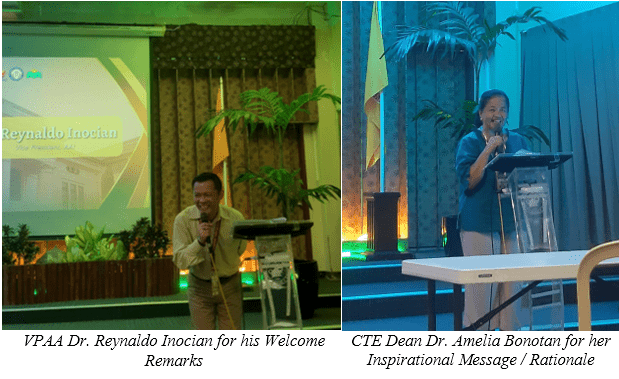
The first speaker is Dr. Aurelio Vilbar who talked about Intercultural Communicative Competence for Multilingual Filipino English Speakers. He presented the different realities of a multilingual society like the Philippines. Firstly, he pointed out that the language learned at home is not really used and taught in school. He connected this with his study about the Mother Tongue Based-Multilingual Education (MTB-MLE) where he found out that teachers have difficulties in teaching certain subjects with the formal and deep register of MTB. Teachers said that despite teaching in Mother-Tongue for the students, they still go back in using the English language to make learning easy and understandable. Another reality presented is the sustainability of teaching the Muslim students in public schools. Muslims use different language so they need a teacher who knows their language as well as culture. This difference plays a role on the sustainability of education for the students because the less teachers there are to teach them, the lesser education would be given for the students. Last reality presented is the fact of having World Englishes which are the varieties of English being used and spoken by different people around the world. These Englishes made the language global, dynamic, and unique. With this reality, Dr. Vilbar finished his talk with this message, “It is more on the sensitivity to one’s culture to be communicably competent in an intercultural society.” It is based on one’s preferences on what variety of language to use as long as it is understandable for him or her and to the person being communicated.
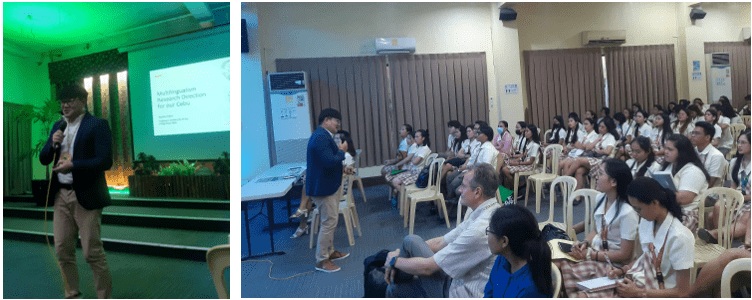
The second speaker is Prof. Dr. Peter Siemund whose talk revolved around his research on Global English in its Local Multilingual Ecologies. He started his talk with a simple thought, “To make the world a better place, you must learn to understand.” He presented his research on the place of English language in local languages used in certain places like Singapore and Dubai. He pointed out that as time goes by, a language shift is happening where English language is now widely used among other languages. This brings risk to the extinction and dying of other languages when they will not be used anymore by its speakers. Dr. Siemund’s thoughts on this reality is focused on the fact that English is permanent. It will always be there to stay and flourish. However, to use English does not mean that one would have to give up on using other languages. English may be universal now but people should not forget their other language which also shapes their own culture.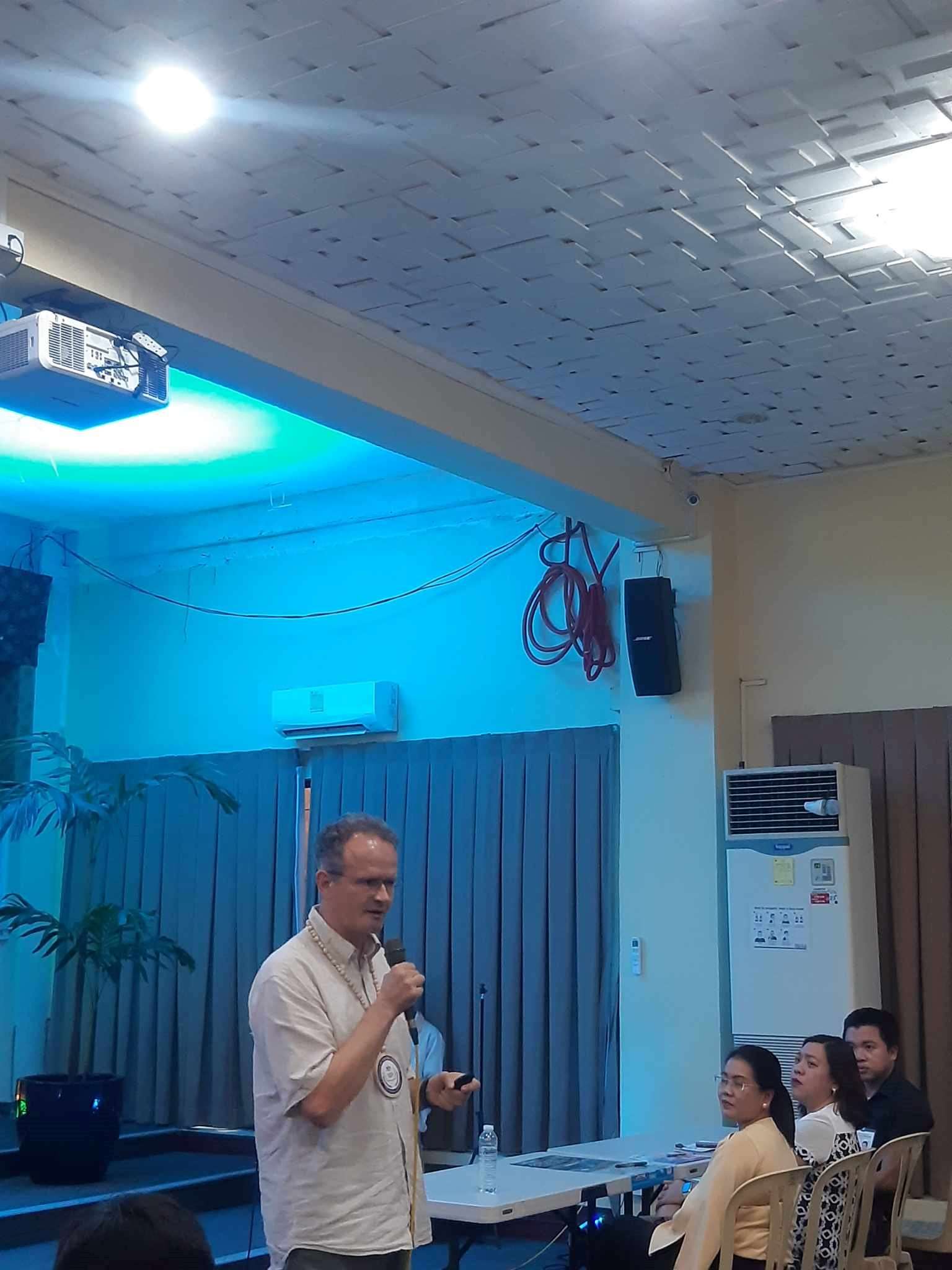
Overall, the two talks given by Dr. Vilbar and Dr. Siemund share an emphasis of understanding the varieties of English and the call for awareness on the language shift of English happening today. Both believe that with the widespread use of English, people did not realize that they have slowly turned back on other languages and forget it. Lastly, they are open to the usage of the different varieties of English as long as it is understandable. One does not have to be strict or be standard-based in using the correct form of the English language because it is a dynamic and evolving language. Each place has its different form of it. There is no correct or standard form of English, even the American-English and British-English are just part of these varieties of English.
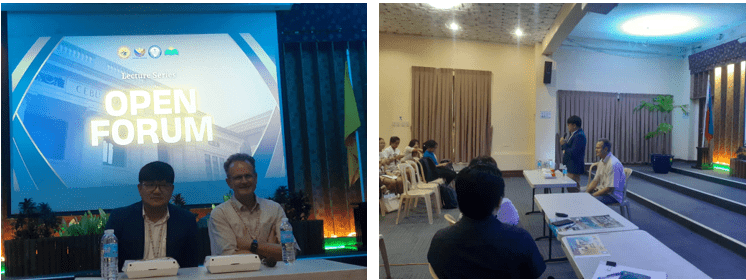
The lecture series ended with Dr. Janet Mananay’s noteworthy hashtag about the event which is #EnglishForLOVE. She gave meaning to each letter of the word LOVE which are the following: L=Language, O=Openness, V=Vigor, E=Endless. This acronym concluded the lecture series with a thought that language is dynamic. Thus, openness is important to understand each other and make the world a better place. Moreover, emerging issues and concerns revolving around language are crucial. Thus, the lecture series ignited the vigor in the hearts of the English major students who are there to become fighters on advocating awareness on the great power of language to society. Lastly, there are endless possibilities that could happen with the English language as well as to the other languages. Hence, people shall also be ready and open for these possibilities to understand each other and continue making the world a better place to live.
